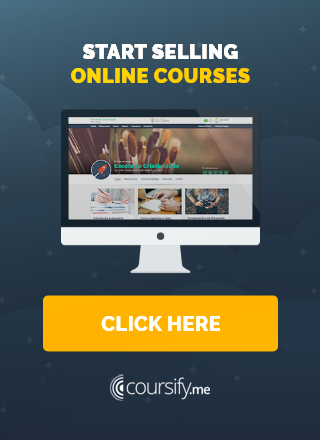How to create an online mini course
An online mini course is a short online course, which takes two hours or less to complete.
This course format addresses a very specific topic and is often used as a growth marketing tool (a teaser for your core product).

Why create an online mini course
An online mini course should be something relatively simple to do.
You can format it by reusing content from your blog, an e-book you’ve already published, a research, and any other material that you own.
If you already have a complete course ready, you can offer a module of it as a mini course.
In this way, the material acts as a teaser and offers a preview of what your student can expect.
– Step by Step to Create Online Courses
Other good reasons for you to create an online mini course are:
- Attract more people and increase your online audience;
- Evaluate the demand to define the topic of your major course;
- Gain some revenue to continue developing content;
- Test your skills before leaving for a major course.
Important tip: If you choose a very specific subject you know like the back of your hand, it is quite likely that in a short time you will have enrolled students.
Step by step to create an online mini course

Ready to create an online mini course and start building your business?
If the answer is yes, know that the key to creating your mini course is … keep it mini.
You can do this through a fairly simple “formula”:
- Create a page for your course in Coursify.me;
- Add some information about yourself;
- Upload the material you have;
- Add pictures or videos, if needed, to explain what your online mini course is all about.
Do you need more information? Let’s go step by step below.
Step 1: Choose a theme for your course
Believe, choosing a theme can be the most difficult part of the process simply because there are so many possibilities and because it seems such an important decision.
In fact, the important thing is that you choose a topic that you have enough knowledge about, that makes you excited to talk about it, and that other people have an interest.
– 5 Practical Tips for Creating Online Courses
Your strategy for making this choice will vary according to your situation, so here are some common scenarios that may apply to you:
You already have content
If you are a blogger, a YouTuber, a podcaster, etc., you probably already have the necessary content to create your online mini course.
You’re in a good place, because you already have an audience, and this audience has probably already told you what they are interested in buying.
Take a look at which blog posts, YouTube videos, or podcast episodes are generating more traffic and engagement.
– 7 Ways to increase your authority on social networks
Does one of your posts appear best ranked in Google search? Maybe you’re already an authority on the subject.
Find the intersection between the best-performing content, what you like best and what you know best.
You are an educator or instructor
If this is the case, it means that you are also prepared to create an online mini course.
Do you do face-to-face training, webinars, etc.? Which lectures or classes are the most popular? Which ones have better reception and attract more audience?
You can take a small piece of a series of lessons or training and set up your mini course.
– Business Training with Coursify.me
You run a business
If you are a consultant who provides the same services again and again, you are also ready to create an online mini course.
The key is to reveal a very small (but valuable) part of what you do.
If you are a marketing consultant, for example, think of what little information your customers find incredibly valuable.
It may be a niche problem, but for people seeking a solution to this issue, buying is an easy decision.
You are starting from absolute zero
In this case, think about the following questions:
- There any content you would like to talk about?
- Do your friends ask you for advice on the same subject over and over again?
- Do you have any special training or experience?
Make a list of all the things you could teach in a course.
Next, mark those that seem especially fun or rewarding to work with.
Take a look at what’s left over and choose the simplest one to create.
Step 2: Provide a solution
Now that you have a theme, it’s time to turn it into a must-have mini course.
The best way to do this is by solving a real problem. Offering a solution that makes a difference in the lives of your students.
Think of it this way: Your target audience has a problem and your course can solve it.
What problem is that? Well, to know this you need to define your theme and do a research to know who is interested in it.
– 3 Ways to Validate your Idea before Creating Online Courses
Enter the theme of your online mini course in Google, Quora, Facebook, Instagram and cia, and analyze the results.
With this brief market research, you will get a good sense of competition, who is interested in the subject, what people talk about it and what their doubts and desires.
Also watch the demand. If there are many courses with the same theme you chose, it may be time to go back to your list of options and select something different, or even more specific.
After doing this research, you’ll get a clearer sense of who your audience is and what problem they want to solve.
The thinking here is that if you have a very specific customer, you also have a very specific problem. And if you can solve this problem, it will be incredibly appealing to your audience.
Think of one of the biggest frustrations in your personal or professional life. Now answer: if someone could solve this problem, would you not pay that person to have the solution?
Step 3: Draw the content
Here we go, it’s time to outline your content.
To begin, think about what things your students need to know to achieve the above solution.
– How to Make a Storyboard to Create Online Courses
Make a quick list and organize them into topics.
For example: Everything a person needs to know to create quality internet videos.
- Video recording
- Audio recording
- Lighting
- Video editing
- Audio and color editing
- Animation
If you have a passion for the subject, it’s easy to get excited and think about inserting more content such as “Optimizing your video for the Internet”, for example.
But, stop and think: Is this something I can teach in just two hours?
Realize how easy it is to lose focus and create something much bigger than an online mini course.
Although, at first, you have to restrain yourself, nothing prevents you from finalizing your mini course and taking advantage of the excitement and ideas to continue creating content.
After posting and selling the short course, you can already give a taste of what’s next.
Step 4: Make the focus even smaller
If your list of skills gets too long, you need to analyze it and break it down into smaller pieces.
Here is an example of some mini courses that could be done just related to the video recording part:
- Frames
- Movements
- Time-lapse
- Posture, Language, Speech Strategies
- B-Roll
Remember that, whatever topic you choose, it should stand alone.
That is, even if this is the only course a student will take from you, it solves a problem and provides value.
Because video recording is a must for many people and something that can help you build your reputation as a specialist, then the advice would be that your online mini course would address this topic exclusively.
Step 5: Format the content
We are talking about an online mini course, but it already seems like a lot of work, and it is.
But if you are finally ready to start creating the content of your course, realize that this huge task is starting to become much more manageable.
The next step is to decide the best way to deliver each part, or section, or class.
There are no rules here, do what is best to facilitate your student’s learning.
It can be a tutorial, a video, a PDF, just a text lesson, etc.
However, if you want a slightly wiser opinion, see the considerations below.
Video content is best for:
- Portraying ideas and concepts in 3 minutes or less.
- Screencasts and guidelines where the student needs to see the exact steps you are taking on the screen.
– Learn How to Record Videos at Home
Downloadable content is best for:
- Cheat sheets, glossaries and other resources that serve to study and as support material.
- Spreadsheets and timelines.
- Slides, tests and other organizational tools.
– How to Create Slides for Online Courses
Text content is best for:
- Explaining a concept in more detail.
- Show step by step information.
- Complement some teaching.
All that’s left to do now is create the content!
Remember that if you are already a content creator, you can re-use the material you have for your online business.
Question: To charge or not to charge for my online mini course?

One of the most frequent questions when it comes to mini courses is: “How much do I charge? It’s free?”.
This is a difficult question, because the answer is super frustrating: It depends.
We do not really have an answer that applies in all cases, but we can give you some advice:
- This is your first course and you do not have an audience: creating an email list to sell your products in the long run is your biggest goal. So offering your course for free as an incentive to attract people is a good idea.
- This is your first course, but you already have an online audience: in this case, charging is a good way to know if your audience is willing to pay to learn more about the subject your course addresses.
- You have already created and sold a course and are using this mini course to test the interest around a new topic: In this scenario, you already have an email list, so charging is a good way to test your audience’s interest in this new idea.
How much should you charge?
For an online mini course, it makes sense to keep the price lower to differentiate from a full course and because, presumably, you spent less time and resources to create it.
If the average price of a course is 100 dollars, for example, an online mini course could be sold for 50 dollars or even less.
At the end of the day, if you are in doubt, ask yourself the following questions:
- What value do you feel most comfortable charging?
- What does your audience want/can afford?
- How does your course compare to others in the same niche?
Course ready and price set, it’s time to put it online and for this you will need an online course hosting platform, also called Learning Management System (LMS).
– Whats is a Learning Management System
A LMS, as its name implies, is basically a SaaS (software as a service) that functions as an online classroom.
Through this platform instructors can offer their courses and online lessons.
Moreover, a LMS have several features that your business will need, such as integration with other content platforms and means of receiving online payment.
Present in more than 60 countries, Coursify.me is a complete eLearning platform, the perfect solution for you to start your own business without having to invest anything for it.
To learn more, visit our website, test the platform and understand why we are the best option for your online courses.

